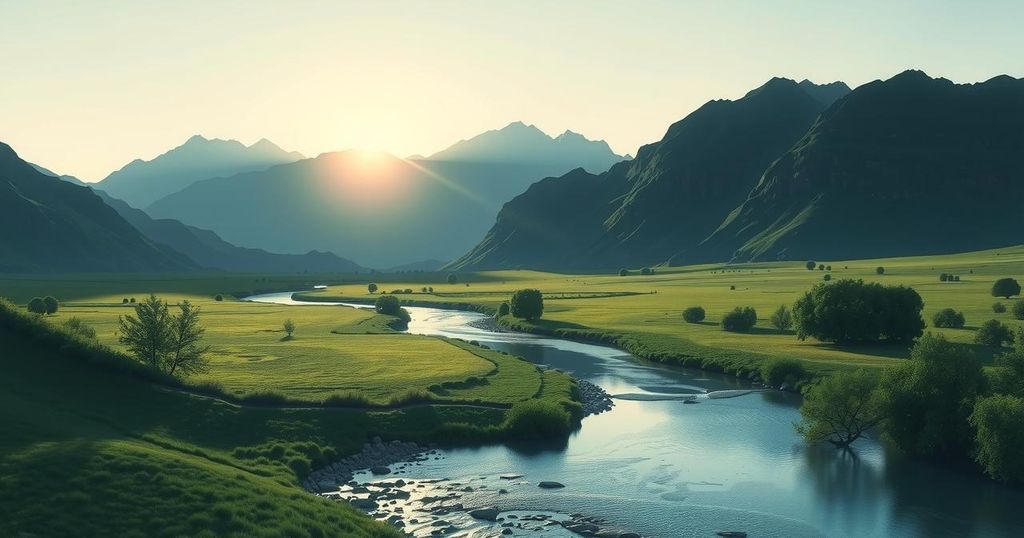The Rwanda-backed M23 group pledged to march towards Kinshasa as they control Goma, raising concerns of escalating conflict in the DRC. Congolese President Tshisekedi committed to a forceful response. International calls for Rwanda’s withdrawal continue, while the humanitarian situation deteriorates, leading to food shortages and mass displacement.
On Thursday, the M23, a Rwanda-supported armed group, declared its intent to advance towards the capital of the Democratic Republic of Congo (DRC), Kinshasa. This follows the group’s recent capture of Goma, the capital of North Kivu province, which escalates tensions in a long-volatile region. Corneille Nangaa, leader of the M23 coalition, asserted, “We will continue the march of liberation all the way to Kinshasa,” emphasizing their commitment until their demands are met. As they consolidate control in Goma, they promise to restore services and facilitate humanitarian aid for displaced populations.
In response to the advancing M23, Congolese President Felix Tshisekedi reaffirmed the nation’s resolve to combat what he deems terrorism, stating that a coordinated response is underway. The United Nations has voiced alarm regarding M23’s movements towards Bukavu in South Kivu, with reports of the group making significant territorial gains. Local residents expressed their desperation for peace, with some stating a desire to resist the group’s authority over their lives.
Internationally, multiple entities, including Angola, the European Union, and the United States, have called upon Rwanda to withdraw its backing of the M23. French Foreign Minister Jean-Noel Barrot engaged in diplomatic discussions with both Rwandan and Congolese leadership regarding the crisis. Rwandan President Paul Kagame criticized Tshisekedi for purportedly allowing external manipulation in the region, framing M23 members as Congolese nationals instead of foreign fighters.
In the wake of these developments, Belgium proposed potential EU sanctions against Rwanda, while the UK indicated it might reevaluate its support for the Rwandan government. The Southern African Development Community has scheduled an emergency summit to tackle the escalating conflict. Kagame, while engaging with South African leadership, pointed out that regional peacekeeping efforts do not fit the current context of violence.
The offensive has intensified a humanitarian catastrophe, leading to significant shortages of food and water and displacing over 500,000 individuals this month alone. As Goma residents emerge from the conflict’s shadow, the dire state of affairs remains evident. Local voices reflect the pressing need for assistance amid plentiful reports of theft and deprivation. Health experts have warned that the ongoing conflict in eastern DRC heightens pandemic risks in an already precarious area.
The conflict in eastern DRC has been marked by violence for decades, often drawing in neighboring countries and a myriad of armed factions. The M23 group’s resurgence is particularly critical due to its association with Rwanda, which has been accused of interfering for economic gain over the region’s abundant mineral resources. The DRC is rich in valuable minerals essential for global technology, fostering continuous geopolitical interests from regional powers. This fraught backdrop complicates local sovereignty and escalates humanitarian crises, necessitating urgent international attention as demonstrated by diplomatic responses from various countries.
The situation in the DRC is marked by escalating violence as the M23 group’s push towards Kinshasa threatens stability in a region plagued by conflict. Both local and international leaders are grappling with profound humanitarian crises exacerbated by armed confrontations and mineral resource exploitation. The international community’s calls for withdrawal of foreign support underscore a pressing need for diplomatic resolution to restore peace and security. Without concerted efforts, the conflict risks spiraling further into devastation, impacting millions caught in the crossfire.
Original Source: www.wfxg.com






